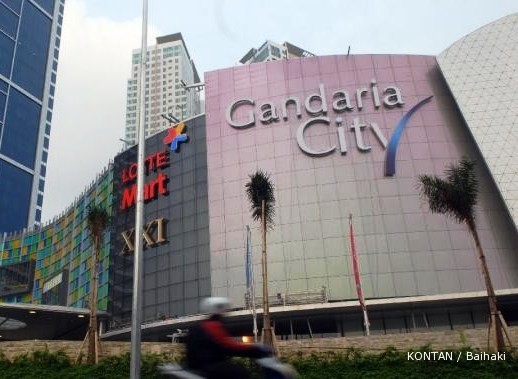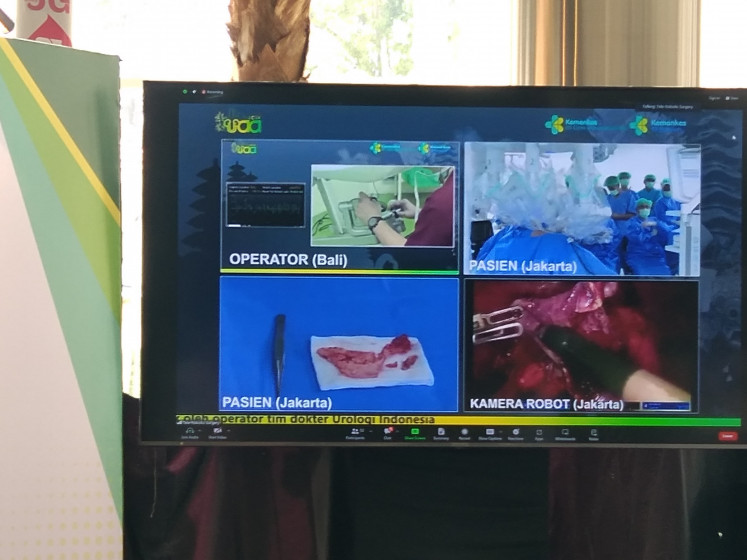Popular Reads
Top Results
Can't find what you're looking for?
View all search resultsPopular Reads
Top Results
Can't find what you're looking for?
View all search resultsReal estate yet to rebound after COVID-19 restrictions lifted
While most industries may have recovered to their pre-pandemic levels, commercial real estate could use a boost through government stimulus in light of lagging occupancy rates and global recession fears, industry insiders have said.
Change text size
Gift Premium Articles
to Anyone

T
he government’s revocation of the remaining public activity restrictions (PPKM) earlier this month should be complemented by more fiscal and monetary stimulus packages to reinvigorate retail and business activities, private sector firms have demanded.
Businesses expected “normality” to return to shopping centers, which would in turn bolster confidence in the economy, but progress would “not be easy” because consumer habits had changed, Real Estate Indonesia (REI) chairman Paulus Totok Lusida told The Jakarta Post.
The government fully lifted the PPKM in early January in the hope of recovering economic growth potential that had dissipated during the COVID-19 pandemic.
The construction sector has not yet returned to pre-pandemic levels, but all other sectors of the economy had recovered, according to the Finance Ministry.
“Shopping centers shifted their priorities during the PPKM era to promote [dining] and attractions,” Paulus said on Wednesday.
He said the shift in strategy came in response to widespread change in consumer behavior during the pandemic, when visitors spent minimal time in malls, which had complicated retailers’ efforts to drive sales.
Paulus attributed the absence of visitors who used to fill Jakarta malls to tenants’ failure to cater to new social trends, particularly by using the internet to promote their goods and services.
Shopping centers were now looking to repurpose vacant space to hold crowd-drawing events to increase visitor numbers.
The average retail occupancy rate in Greater Jakarta has plunged from just below 80 percent in 2019 to an expected 60 percent in 2023, with rates at just 50 percent for mid- to low-end retailers, according to data from property consultancy Colliers Indonesia.
As for high-rise office buildings, Paulus said, property firms had been cutting office spaces by 50 percent on average compared to before the pandemic due to the shift in working patterns from in-office to hybrid and remote work.
The shift away from the in-office working pattern was generally perceived as a win-win, he continued, as it helped employers reduce rental costs while according employees the option to work in the spaces they preferred.
Paulus also noted that remote work was here to stay. But a downside was that it left more vacant space in office buildings, and filling that space with other revenue-generating activity would “take time”.
According to Colliers Indonesia data, office occupancy rates have seen a drop similar to retail occupancy rates since 2019, falling from an average of around 80 percent to 70 percent, with the declining trend expected to continue this year.
Tax incentives for rental property owners could help spur the sector toward recovery, Paulus said, as the value-added tax (PPN) on rent and 10 percent tax on rental incomes cut into the margins of developers and landlords.
He also called on the government to provide stimulus for shopping centers and commercial property owners, including extending the credit restructuring facility for developers after March, when it was due to end as decided by the Financial Services Authority (OJK).
The OJK has extended the credit restructuring policy until March 31, 2024 for the leisure industry as well as for textile and footwear manufacturers and micro, small and medium enterprises, but not for commercial property owners.
“It is impossible for a person who has just recovered from the flu to start exercising immediately,” Paulus analogized.
Ivy Wong, business development director at publicly listed property firm PT Pakuwon Jati, told the Post on Wednesday that visitors had been gradually returning to shopping centers in greater numbers since the government’s announcement that the PPKM would be lifted. Some malls were even reporting figures higher than in 2019.
Pakuwon Jati expected all commercial properties to eventually surpass their 2019 visitor numbers as changes were made to cater to new lifestyles and more workers returned to offices, Ivy said.
“People are less afraid of going to crowded places” and were feeling braver about watching movies at theaters, she added.
Nonetheless, worries over a global recession and possible domestic upheaval in an election year have prompted consumers to hold back on spending, as was reflected by lower sales during the last quarter of 2022.
Pakuwon Jati’s sales and marketing revenue reached Rp 1.17 trillion (US$75.98 million) in the first nine months of 2022, or just 60 percent of its full-year target.
The property firm’s target remains unchanged for 2023.
“I haven’t heard anything, but I’ll be glad to receive any incentives,” Ivy said.
Consumers’ mood had lifted in response to the government’s decision to end the PPKM, PT Ciputra Development director Harun Hajadi told the Post on Wednesday.
The publicly listed developer’s malls had made changes to accommodate an increase in consumer demand for recreation and experiences, Harun said. He added that while almost all local companies were eliminating hybrid and remote work, flexible arrangements often remained in place at foreign-controlled firms.
But Harun said demand had waned since last October due to increasing reports of a global recession.
He also acknowledged the negative impacts of interest rate hikes on the property sector, and though he said the current rates were still manageable, Harun added: “Bank Indonesia should not raise the interest rate any further, if possible.”
Ciputra booked sales and marketing revenue of Rp 6.5 trillion in the January-September 2022 period, or 83 percent of its full-year target.
Colliers Indonesia categorized the office real estate industry as “understandably unhealthy”, as already-low pre-pandemic occupancy rates had now slumped below 70 percent in some segments.
Things might “get a little bit worse”, as more office space was expected to enter the market while demand faltered due to tenant bankruptcy as well as flexible working patterns.
Speaking to reporters on Dec. 14, Colliers Indonesia managing director Mike Broomell described the situation as “the worst I've ever seen in the 30-some years that I've been in Indonesia”.
Meanwhile, the condition of the retail property sector was rated “moderately healthy” due to robust consumer spending on food and beverages, particularly at downtown venues.
Although mall foot traffic had recovered 100 percent to pre-pandemic levels from 40 percent in the early days of the pandemic, the sector’s occupancy rate continued to lag, with speedy recovery seen only in high-end shopping centers.
“High-end malls have tried to keep up with the industry dynamics and follow current customer trends and needs,” said Ferry Salanto, research head at Colliers Indonesia.









